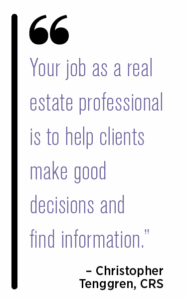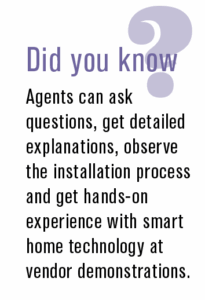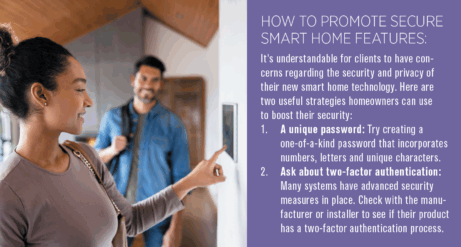By Annika Tourlas
When homebuyers think of a smart home, what do they imagine? Perhaps they reference what they’ve seen in film and television, an elaborate set-up where the house practically comes to life. As residential real estate professionals, we can guide them through what technology offers.
Smart home features have become more popular over the last decade, with many new builds incorporating the Google Nest thermostats or Ring doorbells. However, as technology advances, so do home automation features, which now offer home energy-efficiency solutions, lighting controls and more.
“People are beginning to ask about home automation a lot more than five years ago. Nobody asked about it,” says Tania Bobe, CRS, broker associate and team owner at MB&A Group powered by LPT Realty in Sebring, Florida.
With these features on the rise, it’s important that we know how to walk clients through their available options or the tech behind their new homes.
What Are Available Smart Home Features?
Smart home features are the devices and systems that allow for the control and automation of a home, often remotely via smartphones, voice commands or scheduled routines:
- Security and surveillance systems
- Smart locks and doorbells
- Temperature controls
- Smart appliances
- Sound systems
- Automated lighting
- Energy monitoring
- Music and entertainment controls
While these technologies assist with day-to-day living, when integrated, homeowners can access all household controls with a tap of their finger on a smartphone or tablet, truly embracing home automation.
“I consider a smart home a home that integrates lighting, HVAC, alarm or security, all of those items together in a centralized spot,” says Bobe. “And then you’re able to access it from a remote location on everything.”
Educating Clients on Smart Home Features
With the rise of smart home technology truly kicking off just a few years ago, clients and real estate agents still have much to learn. Staying current on the latest features and products can reinforce your place as a top-tier real estate professional.
How to Discuss Smart Home Features with Homebuyers
Whether you’re an expert in smart home features or not, your clients are bound to have questions. Try incorporating these tactics for stronger smart home conversations:
- Avoid technical jargon: When discussing smart home features, avoid overwhelming homebuyers with technical details or industry jargon. Instead, keep the conversation approachable and reiterate the device’s advantages.
- Offer demonstrations: Offering live demonstrations is a great way to make buyers more comfortable with smart home features by showcasing the device in action.
- Connect them to resources and experts: Try sharing brochures, videos, articles and contact information for installers or tech experts to lead clients toward the answers they need efficiently.
“I think when it comes to advocating for the consumer in any regard, you know, your job as a real estate professional is to help clients make good decisions and find information,” says Tenggren. “I always say we need to be the source of the source, not the source.”
Does Smart Home Tech Impact Home Value?
Within the smart home conversation, many people wonder, “How does smart technology impact home value?” While there is potential for improved home value, the technology is still relatively new, leaving it fairly underexplored by home appraisers.
“It took two decades to get the word out to the appraisal community that there is an addendum to the universal appraisal worksheet, and that’s a green addendum, which talks about green features,” says Tenggren. “So, it’s not just about educating the REALTORS® and the consumers. It’s also about educating the appraisal community because these features do carry value.”
The appraisal and real estate communities have recognized that smart features, like security systems and energy-efficient thermostats, can contribute to a higher perceived value. However, more work must be done to
 assess the true impact of smart features on home value.
assess the true impact of smart features on home value.
How to Reaffirm Tech Safety
As with any piece of new technology, there may be concerns regarding privacy and data sharing. While smart home devices connect to Wi-Fi, they are created with these concerns in mind, making them difficult to breach.
“Even in the best of circumstances, we are all prone to some sort of situation that something can be leaked or compromised,” says Bobe. “But in the 15 years that I have been in this home, I’ve never had an issue.”
To reassure clients about tech safety, emphasize devices’ use of encryption and secure networks. If they have further questions, try guiding them toward reputable manufacturers for an in-depth understanding of their security features.
Smart home conversations don’t have to be intimidating. With the right resources, certifications and communication strategies, you can become an expert in this trending innovation.
How to Be the Expert Your Clients Need
When new technology and home features gain popularity, there is always a learning curve. For agents looking to enhance their knowledge of smart home technologies, there are several effective ways to stay informed:
Pursue Certifications
Several industry leaders offer smart home and energy-efficiency designations. These programs provide in-depth training on the latest devices and connect you to the smart home technology and green energy community, allowing you to distinguish yourself as an expert in this trending niche.
The RRC Smart Home Certification involves courses like Power Up on Smart Home Technologies, Smart Home Technologies for the Residential Specialist and pre-recorded lessons to assist with marketing and tech troubleshooting. Within these courses, you will develop expertise in the devices and learn how to assist in the transition of technology when selling a smart home.
“I’ve learned more than I could have ever dreamed of thinking from an energy-efficiency program,” says Christopher Tenggren, CRS, REALTOR® and managing broker at Weichert REALTORS Signature Professionals in Rochelle, Illinois. “I still network with a lot of my early acquaintances from the program.”
Gain Hands-On Experience
Exploring the use of smart home devices yourself can help you feel more prepared and confident when handling these conversations with clients. Whether familiarizing yourself with the features at a new listing or integrating these devices into your home, hands-on experience can help you understand how they work and improve a home’s functionality.
“I actually have a smart home,” says Bobe. “I feel like I’m more well versed than the average person because I’ve been living with the technology for the past 15 years.”
Attend Vendor Demonstrations
Vendor demonstrations are an excellent way to gain in-depth knowledge and hands-on experience with smart home technologies. During these demonstrations, agents can ask questions, get detailed explanations and even observe the installation process.
Connect with Tech Installers
Installers are experts at configuring and troubleshooting smart home devices. By connecting with local installers, agents can further their understanding of the devices and the challenges that may arise during set-up.









